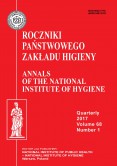Rocz Panstw Zakl Hig 2008, 59(4): 455-465
Indukowana fenobarbitalem hipermetylacja rejonu promotorowego genu p53 we wątrobie szczurów szczepu Wistar
[Phenobarbital - induced hypermethylation of the P53 promoter region in the liver of Wistar rats]
STRESZCZENIE
Indukowane niegenotoksycznymi kancerogenami (NGCs) zmiany metylacji DNA rozpatrywane są jako mechanizm ich toksycznego, w tym rakotwórczego działania. Zbadano wpływ fenobarbitalu (PB), na poziom metylacji regionu promotorowego genu p53 w wątrobie szczurów szczepu Wistar. Zmiany metylacji genu p53 korelowano z syntezą DNA, aktywnością metylotransferaz DNA (DNMTs) oraz z masą wątroby. Samce szczurów szczepu Wistar otrzymywały PB w dawce wynoszącej 98,2 mg/kg m.c. x dzień-1 jednorazowo, 3- krotnie i 14-krotnie. Wykazano, że PB wywoływał hipermetylację w badanych sekwencjach rejonu promotorowego genu p53. Indukowana PB hipermetylacja genu występowała w przebiegu całego okresu doświadczalnego. Stymulację syntezy DNA, która poprzedzała wzrost masy wątroby oraz indukcję DNMTs, wykazano tylko po 1 i 3 dawkach związku. Kontynuowanie narażenia zwierząt na PB (14 dawek) nie wywoływało zmian w syntezie DNA i aktywności DNMTs w porównaniu do kontroli. Przypuszcza się, że indukowana PB de novo metylacja rejonu promotorowego genu p53, nie była związana z aktywnością DNMTs.
ABSTRACT
Non-genotoxic carcinogens (NGCs)-induced changes of DNA methylation has been proposed as a mechanism of their toxicity, including carcinogenic action. The effect of phenobarbital (PB), a rodent liver carcinogen on the methylation level of the p53 promoter region in rat liver was studied. Changes in the methylation status of the p53 gene were correlated with changes in DNA synthesis, DNA methyltransferase (DNMTs) activity and liver weight. Male Wistar rats received PB in one, three or fourteen daily oral doses of 92.8 mg/kg b.w. x day-1. We have demonstrated that PB increased the methylation of the p53 gene. Cytosine hypermethylation in the analyzed CpG sites of the p53 gene promoter occurred during the whole period of study. However, an increase in DNA synthesis was only observed after 1 and 3 days of treatment with PB and it preceded liver growth. Treatment of rats with PB for 1 and 3 days also produced an increase in nuclear DNMTs activity. After prolonged administration (14 days), no changes in DNMTs activity nor DNA synthesis were observed. It is proposed that PBinduced de novo methylation of the p53 gene was not associated with DNMTs activity.
Downloads: 1821


